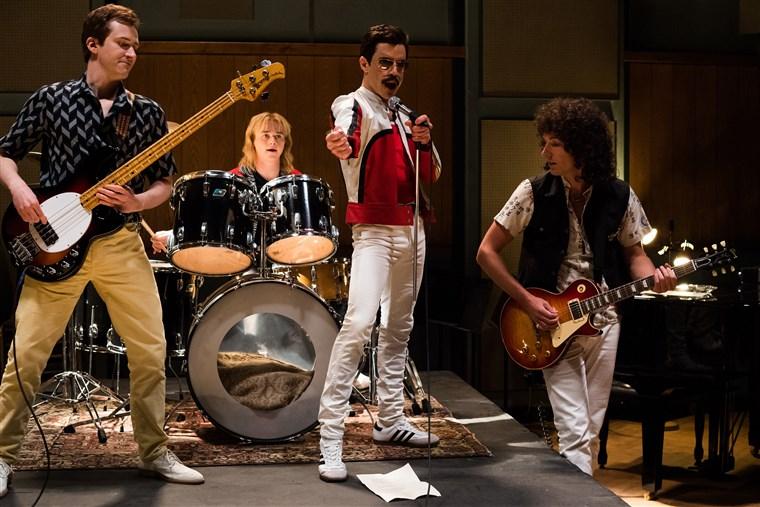The newest movie detailing the rise and fame of Queen could be described as emoitonal, exciting and entertaining. “Bohemian Rhapsody,” directed by Brian Singer, captures the thrilling ride of this band, the challenges they faced, and the considerable achievements they made. The unique style of Queen and their unexpected success was illustrated throughout.
The movie begins by showing lead singer Freddie Mercury’s life at home in London as an aspiring songwriter, with a father dreaming of a normal life for him. Born Farrokh Bulsara, Mercury spent his nights enjoying underground music gigs in London bars, and it was at this time he joined the band Smile. The band had lost their lead singer just in time for Mercury to amaze them in the parking lot with his voice. A year later they were selling out venues across the country and soon became the band Queen as we know them today.
After music producer John Anthony overheard them recording their first album, “Queen,” they signed a record deal with Trident Studios and in 1973 released a second album without much success. However, “Sheer Heart Attack” was released in 1974 and proved extremely successful in Europe and the United States, hitting top charts. The rest of the film follows their success touring and writing albums, but also the challenges they had to overcome with loved ones at home in London and the temptations of personal success while arguing with each other.
The movie mostly focuses on Freddie Mercury’s life as a successful artist struggling to find himself and find happiness in his newfound fame. The difficulty of being gay at the time, especially in the public eye, is shown throughout the film along with the reality of HIV/AIDS for gay men in the 1970-80’s.
It was clear from the very first show he played with Smile that Freddie Mercury was meant to be a performer. His energy and ability to interact with fans on stage was meteoric. While this may have looked awkward in a bar with an audience of 20 people, it was staggering and magnificently entertaining when performing in front of 131,000 people at a show in Sãu Paulo, which holds the world record for the largest paying audience.
The director’s intentions were clear in getting the audience captured in Queen’s triumph while also showing some truths of fame and wealth. The actors do a great job impersonating the stubbornness of the band members, often challenging authority. They have an extremely strong sense of identity shown throughout the film, even dropping a record label because the label refused to release “Bohemian Rhapsody” as a single. Queen constantly pushed boundaries, shocking the industry with their desire to create unique music that had no formula. They aspired to write and produce music that “belonged to their audience and fans”, which the audience could interact with. Their will to not conform to record label formulas and pop culture is what made this band so iconic during their time and even today, nearly half a century later.
“Bohemian Rhapsody” has faced a lot of backlash due to the flat character it portrays Freddie Mercury to be. It seems for some that the film merely touched on his life, hitting the main points without giving full disclosure of what made him such a rock legend. Vanity fair labeled the problem not as an issue with realisticness, but an issue with “the ideas behind Mercury’s portrayal.” Although this may be true, someone that does not have an idea of who Freddie Mercury was can certainly infer from the details squeezed in this two-hour film that he was an incredible person and that he influenced people and rock music. It may not do him justice as a biography of his life, but it does celebrate his band’s legendary achievements, making it a must see movie for all fans of Rock n’ Roll.



































